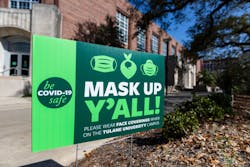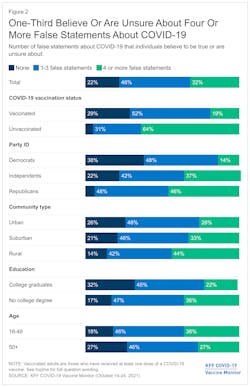A report published on Nov. 8 by a team of reporters from the Kaiser Family Foundation and based on a recent consumer survey executed by the KFF has produced results that could be highly worrisome for clinicians and leaders in U.S. patient care organizations.
The report was written by Liz Hamel, Lunna Lopes, Ashley Kirzinger, Grace Sparks, Melisha Stokes, and Mollyann Brodie, and based on an online survey conducted between Oct. 14 and 24 by the Kaiser Family Foundation.
Sadly, the reporters write, “Belief or uncertainty about COVID-19 misinformation is widespread, with nearly eight in ten adults saying they have heard at least one of eight different pieces of misinformation and either believe them to be true or are not sure whether they are true or false. Most commonly, six in ten adults have heard that the government is exaggerating the number of COVID-19 deaths by counting deaths due to other factors as coronavirus deaths and either believe this to be true (38%) or aren’t sure if it’s true or false (22%).3 About four in ten have heard that pregnant women should not get the COVID-19 vaccine and think this is true (17%) or aren’t sure (22%). Among women ages 18-44, 18% believe this to be true and 29% are uncertain.”
What’s more, “Among other common myths, one-third believe or are unsure whether deaths due to the COVID-19 vaccine are being intentionally hidden by the government (35%), and about three in ten each believe or are unsure whether COVID-19 vaccines have been shown to cause infertility (31%) or whether Ivermectin is a safe and effective treatment for COVID-19 (28%). In addition, between a fifth and a quarter of the public believe or are unsure whether the vaccines can give you COVID-19 (25%), contain a microchip (24%), or can change your DNA (21%).”
To what do the reporters attribute these issues? They write that “Misinformation about health care topics is nothing new, but social media, the polarization of news sources, and the pace of scientific development on COVID-19 have all contributed to an environment that makes it easier than ever for ambiguous information, misinterpretation, and deliberate disinformation to spread.1 We find in the latest Vaccine Monitor that belief in pandemic-related misinformation is widespread, with 78% of adults saying they have heard at least one of eight different false statements about COVID-19 and that they believe it to be true or are unsure if it is true or false. One-third (32%) of all adults believe or are uncertain about at least four false statements. Belief in COVID-19 misinformation is correlated with both vaccination status and partisanship, with unvaccinated adults and Republicans much more likely to believe or be unsure about false statements compared to vaccinated adults and Democrats.”
The report contains numerous data points; but it makes it clear that the divergence between vaccinated Americans and unvaccinated ones is closely tied to their political leanings and to the news media that they consume. The divergence is also connected to the type of community in which people live (urban suburban, or rural), and their level of education (college graduates versus those without college degrees). “With the public’s trust in news media declining over many years, we find that no news media source garners the trust of a majority of the public when it comes to COVID-19 information.,” they write. “While nearly half trust information about COVID-19 that they see on network and local television news, trust is lower for other news outlets and diverges in expected ways along partisan lines. Unvaccinated adults are far less likely than vaccinated adults to trust most of the news sources included in the survey for information on COVID-19, with the exception of conservative news sources.”
People’s trusted news sources are correlated with their belief in COVID-19 misinformation. The share who hold at least four misconceptions is small (between 11-16%) among those who say they trust COVID-19 information from network news, local TV news, CNN, MSNBC, and NPR. This share rises to nearly four in ten among those who trust COVID-19 information from One America News (37%) and Fox News (36%), and to nearly half (46%) among those who trust information from Newsmax. One thing this study cannot disentangle is whether this is because people are exposed to misinformation from those news sources, or whether the types of people who choose those news sources are the same ones who are pre-disposed to believe certain types of misinformation for other reasons.



